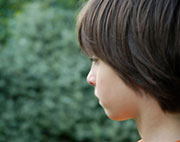- Could Your Grocery Store Meat Be Causing Recurring UTIs?
- Are You Making This Expensive Thermostat Error This Winter?
- Recognizing the Signs of Hypothyroidism
- 10 Strategies to Overcome Insomnia
- Could Artificial Sweeteners Be Aging the Brain Faster?
- Techniques for Soothing Your Nervous System
- Does the Water in Your House Smell Funny? Here’s Why
- Can a Daily Dose of Apple Cider Vinegar Actually Aid Weight Loss?
- 6 Health Beverages That Can Actually Spike Your Blood Sugar
- Treatment Options for Social Anxiety Disorder
Kids With Autism Tend to Be Less Active, Study Says


Children with autism are more sedentary than those without the disorder, but they’re fully capable of being more active, a small study suggests.
Researchers tested the fitness and activity levels of 29 children, some with autism and some without. Children with autism averaged 50 fewer minutes per day of moderate physical activity and 70 more minutes each day sitting than those without autism.
The 17 children with autism scored lower on strength, but had similar body-mass index (a measurement of body fat based on height and weight) scores, and aerobic fitness and flexibility levels, as the 12 without autism.
“These kids, compared to their peers, are similarly fit. That’s really exciting, because it means those underlying fitness abilities are there,” study author Megan MacDonald, an assistant professor at Oregon State University, said in a university news release.
“That’s really important for parents and teachers to understand, because it opens the door for them to participate in so many activities,” she added.
The study was published recently in the journal Autism Research and Treatment.
Further research is required to find out why children with autism, a brain-based disorder, tend to be more inactive, said MacDonald. She suggested it may be because they’re less likely to be involved in organized sports or physical education activities.
“They can do it. Those abilities are there. We need to work with them to give them opportunities,” she said.
For example, she said, parents of children with autism should make physical activity — such as a daily walk or visit to the park — part of the family’s routine.
“Physical fitness and physical activity are so important for living a healthy life, and we learn those behaviors as children. Anything we can do to help encourage children with autism to be more active is beneficial,” MacDonald said.
One out of 68 children in the United States is thought to have an autism spectrum disorder. The main characteristics are impaired communication and social skills and repetitive behaviors.
More information
The U.S. National Institute of Neurological Disorders and Stroke has more about autism.
Source: HealthDay
Copyright © 2026 HealthDay. All rights reserved.










